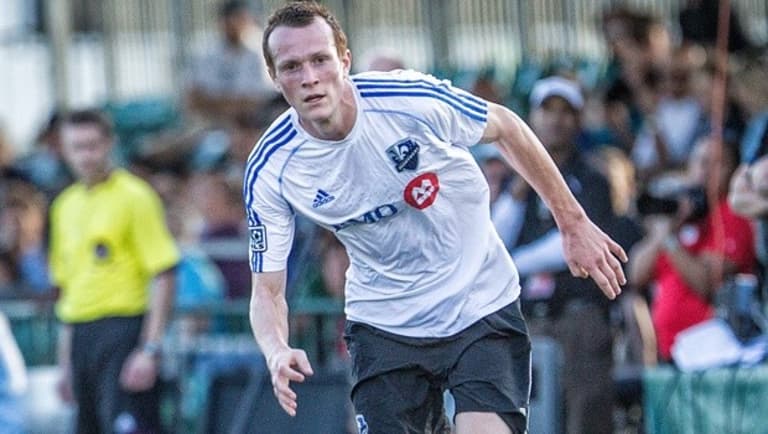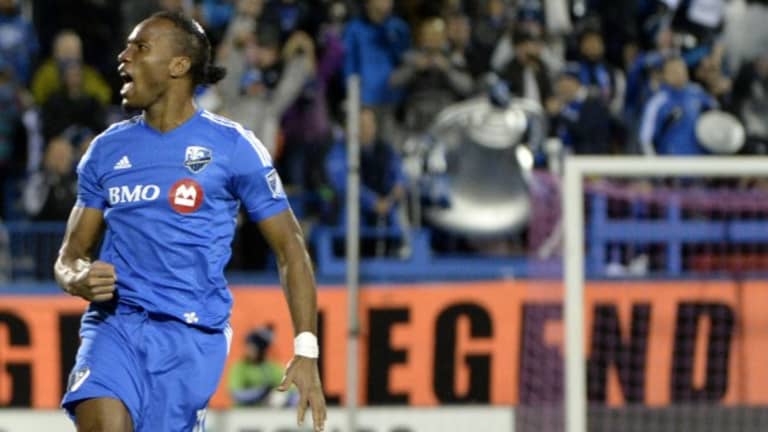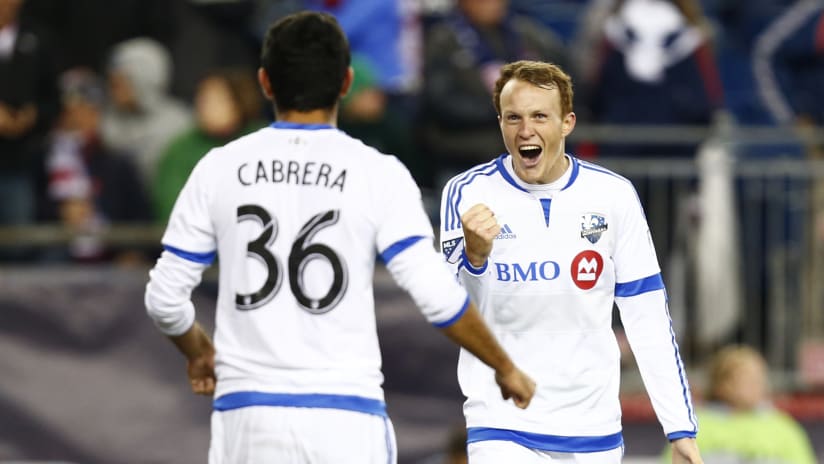1208093028" tabindex="0">Thursday night's Audi 2015 MLS Cup Playoffs Knockout Round clash between the Montreal Impact and Toronto FC (1208093029" tabindex="0">7 pm ET; UniMás, TSN1/4/5, RDS1) is a postseason installment of a rivalry that runs far deeper than soccer, sports or geography.
It's a living embodiment of the socio-cultural rift that lies at the heart of Canada's foundation, dating all the way back to the French and Indian War – better known as the Seven Years' War to most north of the border – in the 1700s.
Canadians have spent much of the ensuing 250 years wrestling with the complex legacy of a shared French and Anglophone identity. For a variety of reasons, Montreal and Toronto have become the collective embodiments of a nation's fraternal twin heritages: awkward and often contentious relatives joined by Highway 401 but divided by the “Two Solitudes.”
Wandrille Lefèvre's partisan allegiances in this faceoff would appear to be clearly demarcated. The Impact's Homegrown center back carries all the hallmarks of French-Canadian life: cultured, fully bilingual and – as a native of France whose family relocated to Montreal when he was 14 – deeply devoted to his home city and the Gallic culture that courses through its veins.
But the defender's story is not so easily packaged. Lefèvre, who is in the mix for a starting role against TFC and their MVP candidate Sebastian Giovincoon Thursday, proudly donned the bright red kit and maple leaf crest of Canada's national team for the first time earlier this month. After finally earning full Canadian citizenship over the summer, he turned in a composed 90 minutes in a 1-1 draw with Ghana in Washington, D.C. on Oct. 13 and is eager to feature in Les Rouges' World Cup qualifying campaign when it resumes against bogey side Honduras in Vancover next month.
In doing so, Lefèvre stands astride Canada's oldest schism with the nuanced worldview of a modern global citizen.
“It's huge, it's huge. You always want to play for your national team,” Lefèvre told MLSsoccer.com on the eve of his international debut. “In my situation, it's special, because I have two countries. I'm French from where I was born and where I've been raised at some point, and then I moved to Canada and it's been 11 years now that I am in Canada.
“I can say that I have both of the cultures, French and the Canadian one. For sure, to be able to play for Canada, the country that welcomed me 11 years ago, where I met friends, my girlfriend and everything – my life is in Canada, my life is in Montreal. So I'm happy to have that opportunity to play for that country.”
Born in Chartres and named after a village in Normandy where his family's heritage lies, he logged time in the youth academy at Perpignan, a club in the south of France, before his father's career led the Lefèvres to pull up stakes for Quebec just over a decade ago. Wandrille admits that it took years for his own self-image to evolve under the influence of a new country. But when it came time for his parents to return home, he elected to stay and finish his education – both in the classroom and on the soccer field, after Impact academy coach Philippe Eullafroy spotted him in action for the University of Montreal.

“If I'm really honest, it's weird,” the 26-year-old said of his dual-national identity. “Because all my life I consider myself French, because of where I was born and where I grew up; all those years of your life are important in terms of what do you feel. At home, I was speaking French, with a French family, my brother and everything all live in France. So for sure I considered myself French, and France is a big, big country for me.
“But then the reality is after 11 years in Canada, it's a feeling that starts to be felt inside me, for sure, to realize that, yeah, I've got that Canadian culture at some point. My girlfriend is Canadian-Lebanese, right, but she's Canadian – all my friends, they are Canadian. The degree that I have at university, it's a Canadian degree. There's a lot of things that over the years I've achieved that are now part of my life, that are part of Canada. For me, even before being Canadian, when I was asked, 'What is your city?' My city is Montreal. I'm not saying Paris, I'm not saying Montpellier, I'm not saying some city in France. My city is Montreal.”
Fiercely proud of its unique heritage, Quebec has long been a restive province, repeatedly mulling independence from Canada, and some Québecois still dream of a national team of their own.
Not Lefèvre.
“No, I think it's good like this, to unify Canada under the same flag, under the same culture,” he said. “But it doesn't mean that Quebec doesn't have its own culture. You can have different, let's say different parts of culture, different reasons to fight for this or this or that inside a country. But at the end of the day, I think it's good for Canada. There are different provinces; Canada is a big country, really spread out. But you can have that common flag, that common culture that allies everyone to each other.”
Over the past two months, Lefèvre's Impact have vaulted from long-term prisoners of the Eastern Conference basement into third-place finishers. Didier Drogba has gotten most of the credit for this dizzying acceleration up the standings, and rightly so. The Ivorian Designated Player has netted 11 goals in just 11 league matches since his midsummer arrival, helping Montreal average more than two points per game down the stretch – a torrid pace that would've comfortably won them the Supporters' Shield had they kept it up all year long.
More than numbers alone, his world-class striking skillset – allied with the raw force of his spirit and charisma – have transformed the Impact into one of this postseason's dark horses. Lefèvre makes clear that Drogba's influence has already surged through the entire organization.
“As everybody knows around the world, he's a great soccer player, obviously. But for me it's not what matters the most. It's the man that he is,” Lefèvre said. “He's a wonderful person, he's a great leader, he's someone that brought a lot to the team since he first came in the locker room. In terms of leadership, culture of winning – and then after, for sure on the pitch, he brings something different in terms of the quality that he has.

“For example, me as a center back, if there's a lot of pressure coming, I know that I can chip that ball in a [Lefèvre gestures in a wide circle] large area, and he's going to fight for it, he's going to put it on his chest, put the ball on the ground and we'll play from there. He brings something really great to this team, and you know he has goals … but also the work that he puts in every, every game. Fighting for those balls, coming back, heading the ball out on corners for us to defend, to clear the ball. All those little things that are great things at the end. For me, for the players around him, you want to play for that guy – not only with that guy, but for that guy.”
Less easily noticed than Drogba's star turn, however, is the dramatic tightening of a defense which has allowed less than one goal per game since the longtime Chelsea star made his first Impact start in a 4-3 defeat of Chicago on 1208093031" tabindex="0">Sept. 5.
That wild win over the Fire – an occasion dominated by Drogba's hat trick – was interim head coach Mauro Biello's first game in charge following the dismissal of Frank Klopas. Biello's rise has coincided with a turnabout in fortunes for both Lefèvre individually (who spent much of the summer in Klopas' doghouse) and the back line as a whole. Dating from the Fire win, the Impact are 3-0-2 in games in which Lefèvre has started.
“Since we changed the coach, I've played a lot,” he said. “I've played good games, especially on the road in the California trip [where Montreal earned gritty road draws at LA and San Jose] and everything. So yeah, the next step was probably to be called by the national team.”
After using a variety of center-back pairings during the Impact's playoff push, Biello elected to partner River Plate loanee Victor Cabrera with veteran linchpin Laurent Cimanin last week's Decision Day win over TFC, and may well keep continuity for 1208093032" tabindex="0">Thursday's win-or-else clash. But Lefèvre is ready for any role, buoyed by a surging collective confidence that has the team believing anything is possible.
“We're going to definitely be one of the teams to beat, because of the momentum,” he said. “MLS is not about how you're starting, it's about how you finish. If you finish strong, you put yourself in a good position to go through the different games that you have to play in the playoffs. This is not something I invented from my imagination, no? Every year you could see that. New England last year: New England was not a team that all over the season was dominating. But at some point, they finished really strong, and they reached the final.”
Lefèvre will be hoping the Impact are still alive when his next opportunity for a Canadian callup from coach Benito Floro arrives in mid-November. Canada have been drawn into a rugged qualifying group alongside Mexico, El Salvador and Honduras – their tormentors in recent history. But Lefèvre and his new teammates, with whom he got acquainted during the 10-day training camp at the outset of October, see a path to the more forgiving environs of CONCACAF's final, “Hexagonal” stage.
“You know, being at the World Cup is the dream of every soccer player around the world. How many countries play soccer around the world? Probably all the countries. So you have to deserve your spot to go to Russia,” he said. “So there's two parts for us: That first step, [semifinal-round] qualification step, but I think if we're able to go through that first step, that means that the second step is something that we can do, something that we can achieve. Because in our group, we have teams like Mexico, Honduras, they're good teams. So if we are able to go through that group, that means that we're able also to go through that next point.”
Can a new generation of Canadian talent help Les Rouges overcome three decades of heartache to regain a place on the world's biggest stage? The odds are long, but the likes of Lefèvre have given fans a welcome reason for optimism – and a fitting reflection of their own evolving, modern nation.













